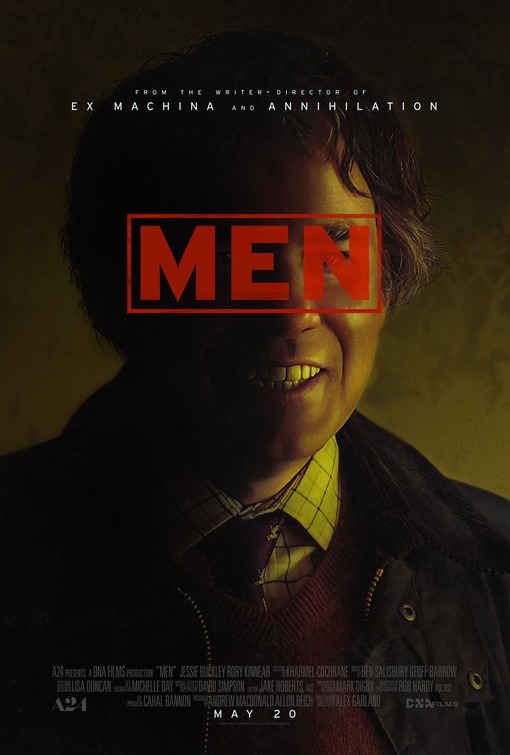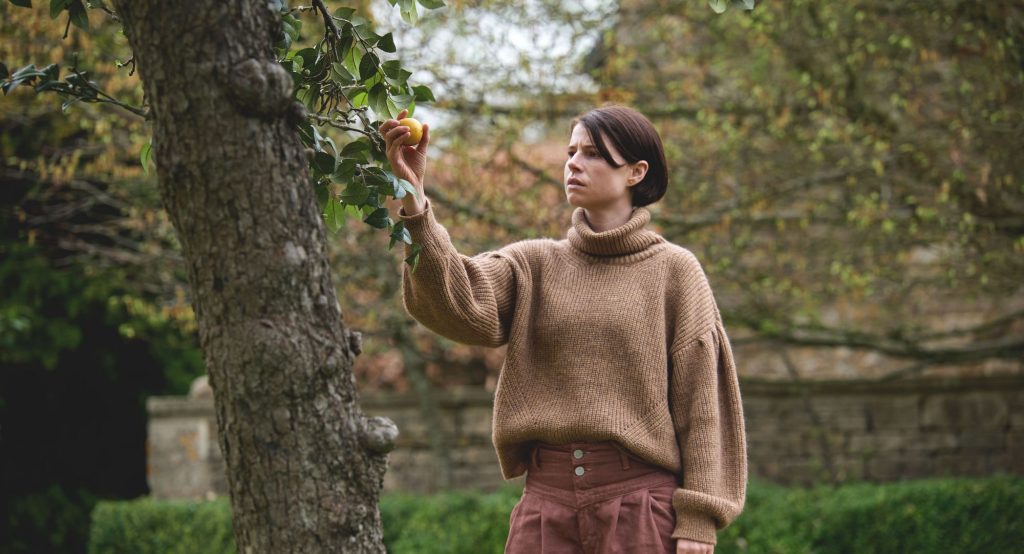
An impressive setup is always appreciated, but a satisfying conclusion is fundamental. Obviously, a movie should hold up from start to finish, but a great beginning is all for naught if the resolution can’t make good on the buildup. Men is the manifestation of a promise unfulfilled, an interesting idea that devolves into a disappointment.
Jessie Buckley is Harper Marlowe, a woman who retreats to the English countryside after her husband’s (Paapa Essiedu) death. They had a heated argument in James’ final moments. He became abusive and struck Harper in the face. She angrily pushed him out of the room and locked the door. He either attempted to climb back into the room from the 2nd floor and slipped or purposefully committed suicide by jumping, impaling himself on the iron fence below. His passing haunts her. A retreat to more peaceful surroundings does little to allay her anxiety.
Men is a folkloric fable that exploits the darkness of rural landscapes. The Wicker Man is perhaps the granddaddy of the genre but The Witch, Midsommar, and Lamb are all recent examples that did this skillfully. At the very least, Alex Garland vividly extracts an unsettling atmosphere from the seemingly tranquil setting of a country estate. Ah but something sinister is afoot. The first half employs the splendid cinematography of frequent collaborator Rob Hardy in an account of a woman’s unease. Harper hopes to alleviate her stress. The heart of the drama is built on the solid base of a compelling performance. Actress Jessie Buckley engenders our sympathy. That’s key. Actor Rory Kinnear is also memorable as the landlord of the manor where she’s staying. He is — as the English say — an odd duck. Also bizarre are the townsfolk of the village. These include a vicar, a policeman, and a schoolboy. Each one is an insensitive male figure with a dismissive attitude. Rory Kinnear plays them all.
I enthusiastically anticipate a new production from Alex Garland. He gained notoriety with screenplays that included 28 Days Later, Sunshine, and Never Let Me Go. Then cemented this reputation with his directorial debut Ex Machina. He followed with Annihilation. I had high expectations for his latest offering. The tale brilliantly creates the impending sense of dread for a woman. I felt that. The appearance of a stalker in the garden of the estate is a disturbing image I won’t soon forget.
Sadly, the chronicle doesn’t end well. The allegory is rife with symbolism. The cerebral exercise inserts pagan iconography like the Sheela-na-gig and the Green Man without explanation. When she first arrives, Eve — er uh I mean Harper — picks and eats forbidden fruit from a tree in the garden. But what exactly is Garland trying to say? Deciphering a story bereft of a plot but loaded with imagery can be daunting — especially when the metaphors aren’t profound. As the saga limps toward its crushing denouement, one can only luxuriate in the mood. Delve further to decipher the meaning beneath what’s presented and I uncovered a superficial objective, unsuccessfully realized.
The ickiest body horror in filmdom can repel or fascinate based on context. David Cronenberg (The Brood, Scanners, Videodrome, The Fly) practically originated the genre. At the very least, he regularly exploited it. John Carpenter’s The Thing, and Rick Baker’s makeup for An American Werewolf in London are iconic examples. Those hallucinatory displays served the narrative and elevated the plot. Here the payoff rests on an over-the-top effect designed to shock, but to what end? I’ll leave a deep psychological analysis of its themes to the viewer. However, it’s hard to ignore that Alex Garland has saddled his movie with such an all-encompassing title. Men suggest the overall conflict between the sexes. Its reflection on gender is — at best — obvious and superficially explored. I didn’t glean any insight or enlightenment from the presentation. This ultimately failed in execution.
05-19-22


3 Responses
Saw this twice. The first time I thought I knew what it was about. My mom saw it by herself and said it was simply creepy and weird. Saw it again w her and that solidified my opinion and when I tried to explain it in the only terms I knew how she was even more confused…
I love to hear the details on how you explained it.
If you took the most basic element from anomalisa combined it w the religious allegory of mother! Shot in the style of melancholia and thre in the gory surreal cgi of Hannibal at the End it might turn out something like this… anything more in depth would involve spoilers